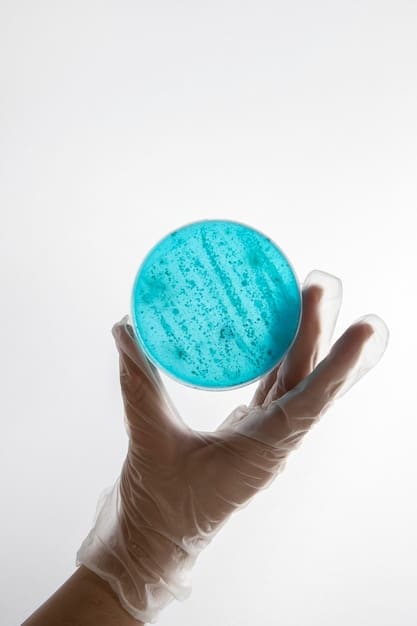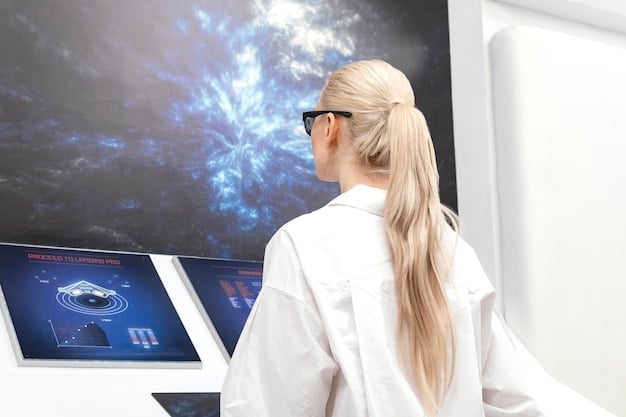Biotech Breakthroughs: US Startups Shaping Future Therapies and Diagnostics

Emergent US biotech startups are at the forefront of revolutionizing healthcare, actively developing cutting-edge therapies and diagnostics that promise to transform disease treatment, prevention, and personalized medicine by leveraging advanced scientific discoveries and innovative technological platforms.
The landscape of modern medicine is continuously reshaped by innovation, and at its core, a vibrant ecosystem of new ventures is propelling the next great leaps. This edition of our Startup Spotlight: Biotech Breakthroughs – US Startups Developing Cutting-Edge Therapies and Diagnostics delves into the dynamic world of American biotech, examining the pioneering companies set to redefine health and healing through remarkable scientific advancements and ingenious technologies.
The Burgeoning Biotech Landscape in the US
The United States has long been a global epicenter for biotechnological innovation, fostering an environment where groundbreaking scientific discoveries can rapidly transition into viable medical solutions. This fertile ground is cultivated by world-class academic institutions, robust venture capital funding, and a regulatory framework, albeit complex, that supports innovation. The sheer volume of intellectual property generated and the entrepreneurial spirit prevalent in key hubs like Boston, San Francisco, and San Diego create an unparalleled ecosystem for biotech startups.
This dynamic environment is not merely about incremental improvements; it’s about paradigm shifts. Startups in this sector are tackling some of humanity’s most persistent health challenges, from rare diseases to widespread conditions like cancer and neurodegenerative disorders. Their approaches often involve novel modalities that were unthinkable just a few decades ago, utilizing genetic engineering, advanced computational biology, and sophisticated drug delivery systems to unlock new therapeutic possibilities.
Key Growth Drivers and Investment Trends
Several factors are fueling the rapid expansion and investment in US biotech. A deeper understanding of human biology, driven by genomics and proteomics, allows for more targeted and effective interventions. Technological advancements, such as AI and machine learning, are accelerating drug discovery and development processes, significantly reducing the time and cost associated with bringing new treatments to market. Furthermore, a growing aging population globally and the increasing prevalence of chronic diseases generate a perpetual demand for innovative healthcare solutions.
Venture capital plays a critical role in nurturing these nascent companies. Investors are drawn to biotech’s potential for high returns, especially given the promise of truly transformative therapies. The trend leans towards early-stage funding for companies with strong scientific foundations and clear paths to clinical validation. This influx of capital enables startups to invest heavily in research and development, conduct rigorous clinical trials, and navigate the complex regulatory pathways. The sustained interest from both established pharmaceutical companies and new investors signals a strong belief in the long-term potential of the biotech sector.
Revolutionizing Therapy: Decoding Novel Modalities
The traditional small-molecule and biologic drug development paths are being augmented—and in some cases, supplanted—by genuinely revolutionary therapeutic modalities. US biotech startups are at the forefront of this shift, exploring new ways to interact with biological systems at their most fundamental levels. This includes gene therapies that correct genetic defects, cell therapies that harness the body’s own healing capabilities, and RNA-based therapies that interfere with disease-causing protein production.
These novel modalities offer unprecedented specificity and potency, targeting diseases with precision that was previously unattainable. The development cycle for these therapies is often very different from conventional drugs, involving highly specialized manufacturing processes and rigorous safety evaluations. However, the potential to cure diseases rather than just manage symptoms is a powerful motivator for continued investment and research.
Gene Therapy: Rewriting the Genetic Code
Gene therapy, once a distant dream, is rapidly becoming a clinical reality. Startups in this space are developing treatments for genetic disorders by introducing new genetic material into a patient’s cells to compensate for faulty genes or to make a beneficial protein. Initial successes in treating rare diseases like spinal muscular atrophy and certain forms of inherited blindness have paved the way for broader applications. Challenges remain, particularly concerning delivery mechanisms and long-term safety, but ongoing research promises to address these hurdles.
- Adeno-associated virus (AAV) vectors are widely used for delivering therapeutic genes.
- CRISPR-Cas9 and other gene editing tools are enabling precise genetic modifications.
- Focus expanding from monogenic disorders to more complex conditions.
Cell Therapy: Harnessing the Body’s Own Power
Cell therapies involve administering living cells to a patient to treat a disease. This includes CAR T-cell therapies for cancer, where a patient’s own immune cells are engineered to fight tumors, and stem cell therapies for tissue regeneration. The complexity of manufacturing and delivering live cells, along with managing potential immune reactions, presents significant challenges. Nevertheless, the transformative impact of these therapies on patients with previously intractable diseases underscores their immense potential.
- CAR T-cells have shown remarkable success in hematological malignancies.
- Stem cell research is exploring regenerative medicine for various organ systems.
- Allogeneic (off-the-shelf) cell therapies are a major development focus.

Advancing Diagnostics: Greater Precision, Earlier Detection
Beyond therapeutic breakthroughs, US biotech startups are also radically transforming diagnostics. The ability to accurately and promptly identify diseases, monitor treatment efficacy, and predict disease progression is fundamental to effective healthcare. New diagnostic tools are becoming increasingly non-invasive, more sensitive, and capable of providing rich, multi-dimensional data.
These advancements are driving a shift towards personalized medicine, where treatments can be tailored based on an individual’s unique biological makeup. From liquid biopsies for early cancer detection to advanced imaging techniques and wearable biosensors, the frontier of diagnostics is expanding rapidly, promising better patient outcomes and more efficient healthcare systems. The integration of AI and big data analytics is playing a crucial role in interpreting the vast amounts of information generated by these new diagnostic platforms.
Liquid Biopsies and Precision Oncology
Liquid biopsies represent a game-changer in oncology, allowing for cancer detection through a simple blood test. Startups are developing highly sensitive assays that can detect circulating tumor DNA (ctDNA), circulating tumor cells (CTCs), and other biomarkers long before a tumor is physically detectable. This early detection capability holds the key to improving survival rates for many cancers. Furthermore, liquid biopsies enable real-time monitoring of treatment response and resistance, guiding oncologists in making more informed decisions.
Precision oncology relies heavily on these advanced diagnostics to identify specific genetic mutations or molecular markers in a patient’s tumor that can be targeted by specific therapies. This eliminates the “one-size-fits-all” approach, leading to more effective treatments with fewer side effects. Biotech startups are at the forefront of developing comprehensive genomic profiling panels and companion diagnostics that pair therapies with the patients most likely to benefit.
AI-Powered Diagnostics and Digital Health
Artificial intelligence and machine learning are revolutionizing diagnostic processes. AI algorithms can analyze medical images (radiology, pathology slides) with astounding accuracy, often exceeding human capability in detecting subtle anomalies. They are also being used to process vast datasets from patient records, genetic profiles, and clinical trials to identify disease patterns and predict risks. Digital health platforms, often integrating wearable devices and remote monitoring, are providing continuous data streams that can alert healthcare providers to changes in a patient’s condition, enabling proactive interventions.
These technologies are making diagnostics more accessible, efficient, and predictive. The ability to leverage large-scale data to inform clinical decisions represents a powerful shift towards proactive and personalized healthcare, moving beyond reactive treatment of symptoms. Startups specializing in these areas are attracting significant investment, recognizing the immense potential to streamline healthcare delivery and improve patient lives.
Beyond Treatments: Genomics and Data-Driven Healthcare
The revolution in biotech extends far beyond just developing new drugs and diagnostic tests. At its core, it’s about harnessing the power of genomic information and applying data science to unlock deeper insights into health and disease. US biotech innovators are leading the charge in building foundational technologies that enable a truly data-driven approach to healthcare, from understanding individual susceptibilities to predicting drug responses.
The cost of sequencing a human genome has plummeted over the past decade, making genomic data increasingly accessible. This has opened doors for companies focused on population genomics, pharmacogenomics, and even direct-to-consumer genetic testing. The challenge now lies in effectively interpreting this massive amount of data and translating it into actionable clinical insights. This is where AI, machine learning, and advanced bioinformatics play a crucial role, allowing complex biological interactions to be modeled and understood.
Personalized Medicine and Pharmacogenomics
The ultimate goal of many biotech advancements is personalized medicine – tailoring medical treatments to individual characteristics of each patient. Pharmacogenomics, a key component, studies how genes affect a person’s response to drugs. By understanding an individual’s genetic makeup, doctors can predict whether a patient will respond well to a particular medication, require a different dosage, or experience adverse side effects. This minimizes trial-and-error prescribing, leading to more effective and safer treatments.
- Genetic variations influence drug metabolism and efficacy.
- Pharmacogenomic testing guides selection of antidepressants, chemotherapy, and pain medications.
- Startup focus on developing actionable genetic reports for clinicians.
AI and Machine Learning in Drug Discovery
The traditional drug discovery process is famously long, expensive, and prone to high failure rates. Biotech startups are leveraging artificial intelligence and machine learning to dramatically accelerate and improve this process. AI algorithms can analyze vast chemical libraries to identify potential drug candidates, predict their properties, and even design novel molecules. They can also sift through complex biological data to identify new drug targets, understand disease mechanisms, and optimize clinical trial designs. This data-driven approach promises to significantly reduce the time and cost involved in bringing new therapies to patients.
- AI accelerates hit identification and lead optimization.
- Machine learning predicts toxicity and efficacy more accurately.
- Computational biology aids in understanding protein folding and interaction.
Investment and Economic Impact: Fueling Innovation
The biotech sector is a significant engine of economic growth in the United States, attracting substantial investment and creating high-value jobs. Venture capital firms, corporate partners, and even public markets are pouring billions into innovative biotech companies, recognizing the immense potential for both financial returns and societal impact. This robust investment ecosystem is critical for transforming cutting-edge scientific ideas into tangible medical products and services.
The economic impact extends beyond direct revenue generation. Biotech companies often foster local economies by creating specialized jobs, building state-of-the-art facilities, and driving demand for related services. Furthermore, successful therapies can reduce healthcare costs in the long run by preventing disease, curing chronic conditions, and improving quality of life, thereby creating a positive feedback loop for economic health and innovation.
Venture Capital and Funding Rounds
Venture capital is the lifeblood of early-stage biotech startups. These firms specialize in identifying promising technologies and providing the necessary capital to move from concept to preclinical and clinical development. Large funding rounds signal investor confidence and enable companies to scale operations, attract top talent, and navigate the complex regulatory landscape. The competition for funding is intense, pushing startups to develop strong scientific propositions and clear commercialization strategies.
Beyond initial seed rounds, biotech companies often go through multiple stages of funding, including Series A, B, and C rounds, often culminating in an initial public offering (IPO) or acquisition by a larger pharmaceutical company. This progression reflects successful achievement of key milestones, such as positive preclinical data or favorable clinical trial results. The ability to consistently raise capital is a critical indicator of a biotech startup’s potential for long-term success.
Strategic Partnerships and Acquisitions
Strategic partnerships between biotech startups and established pharmaceutical companies are a common and vital aspect of the industry. These collaborations allow startups to leverage the vast resources, manufacturing capabilities, and global distribution networks of larger firms, while big pharma gains access to innovative technologies and pipelines without having to build them in-house. Acquisitions are also frequent, presenting lucrative exit opportunities for investors and founders.
These partnerships often involve joint research agreements, licensing deals, or co-development initiatives. They are mutually beneficial, accelerating the development and commercialization of new therapies. For startups, a partnership can provide the financial stability and expertise needed to bring a drug to market; for large pharmas, it’s a way to refresh their product portfolios and stay competitive in a rapidly evolving scientific landscape. This collaborative ecosystem ensures that groundbreaking discoveries have the best chance of reaching patients in need.

Challenges and Future Outlook for Biotech Startups
While the prospects for US biotech startups appear overwhelmingly positive, the path to success is fraught with significant challenges. The scientific hurdles are immense; many promising therapies fail in clinical trials due to efficacy or safety concerns. The regulatory environment is stringent, requiring extensive data and adherence to complex guidelines, which adds significant time and cost to development.
For every success story, there are numerous ventures that do not make it to market. This high-risk, high-reward nature defines the sector. However, the collective resilience and adaptability of biotech innovators, coupled with continuous advancements in science and technology, suggest a future where these challenges are increasingly surmountable. The focus remains on translating scientific breakthroughs into tangible patient benefits, making healthcare more effective, efficient, and accessible.
Regulatory Hurdles and Clinical Trials
Navigating the regulatory landscape, primarily overseen by the FDA in the US, is one of the most significant challenges for biotech startups. The process for drug approval is lengthy, rigorous, and incredibly expensive, often requiring multiple phases of clinical trials to demonstrate safety and efficacy. Each phase brings its own set of challenges, from patient recruitment to data analysis and regulatory submissions. A single setback can derail years of research and massive investments.
Furthermore, novel therapeutic modalities, such as gene and cell therapies, often face an evolving regulatory framework, as agencies work to establish precedent and guidelines for these unprecedented treatments. Startups must be adept at clinical trial design, data management, and regulatory strategy to successfully bring their innovations to patients. This often requires specialized expertise and significant financial resources, underscoring the high stakes involved in biotech development.
Talent Acquisition and Competition
The biotech sector is highly specialized, requiring a unique blend of scientific expertise, clinical knowledge, and entrepreneurial acumen. Attracting and retaining top talent—from molecular biologists and geneticists to clinical development specialists and regulatory affairs experts—is a constant challenge for startups. The demand for skilled professionals often outstrips supply, leading to intense competition for human capital, particularly in major biotech hubs.
This competition extends to intellectual property. Protecting patents and trade secrets is crucial for biotech companies, as their value is largely derived from their proprietary technologies and therapeutic pipelines. The race to be first to market with innovative solutions, coupled with the need to defend intellectual property, creates a highly competitive environment. Only those startups with strong scientific foundations, effective operational strategies, and the ability to build and retain exceptional teams are likely to succeed in this demanding landscape.
| Key Area | Brief Description |
|---|---|
| 🧬 Gene Therapies | Correcting genetic defects by introducing new genetic material. |
| 🔬 Cell Therapies | Using living cells to treat disease, like CAR T-cells for cancer. |
| 🧪 Liquid Biopsies | Non-invasive blood tests for early cancer detection and monitoring. |
| 💻 AI in Biotech | Accelerating drug discovery, diagnostics, and personalized medicine. |
Frequently Asked Questions
▼
Biotech breakthroughs in the US are typically defined by novel therapeutic modalities or diagnostic platforms that significantly alter how diseases are treated or detected. This includes innovations in gene editing, advanced cell therapies, sophisticated liquid biopsies, and AI-driven drug discovery, offering unprecedented precision and efficacy in addressing complex health challenges.
▼
US biotech startups are primarily funded through venture capital, which provides seed, Series A, B, and C rounds. They also secure capital through strategic partnerships with larger pharmaceutical companies, government grants, and public market offerings like IPOs. This diverse funding ecosystem supports the high-risk, high-reward nature of biotech development.
▼
US biotech startups are intensely focused on oncology (cancer treatment), rare genetic diseases, neurodegenerative disorders, and infectious diseases. They are also exploring advanced applications in regenerative medicine and precision medicine, leveraging a deeper understanding of molecular biology and genetic predispositions to develop highly targeted treatments.
▼
Diagnostics are crucial for biotech breakthroughs by enabling earlier, more accurate, and less invasive disease detection. Innovations like liquid biopsies facilitate early cancer screening, while AI-powered diagnostics improve image analysis and disease prediction. These advancements allow for personalized treatment strategies and better monitoring of patient responses, leading to improved outcomes.
▼
Biotech startups in the US face significant challenges including navigating complex and lengthy regulatory approval processes, particularly with the FDA. They also contend with high failure rates in clinical trials, intense competition for scientific talent, and the constant need for substantial capital to fund extensive research and development.
Conclusion
The landscape of biotech in the United States continues to be a beacon of innovation, driven by ambitious startups that are relentlessly pushing the boundaries of what’s medically possible. From revolutionary gene and cell therapies offering curative potential to sophisticated diagnostics that enable unprecedented precision in disease detection and monitoring, these companies are not merely developing new products; they are crafting the future of healthcare. While the journey is often arduous, marked by scientific complexities and significant financial hurdles, the sheer promise of transforming patient lives fuels an unwavering dedication. The continued collaboration between scientific pioneers, astute investors, and regulatory bodies will undoubtedly ensure that the US remains at the forefront of biotechnological advancement, bringing hope and healing to countless individuals worldwide.





